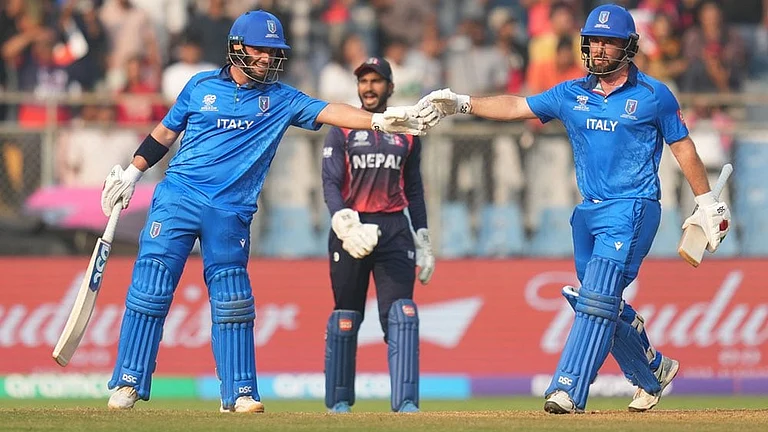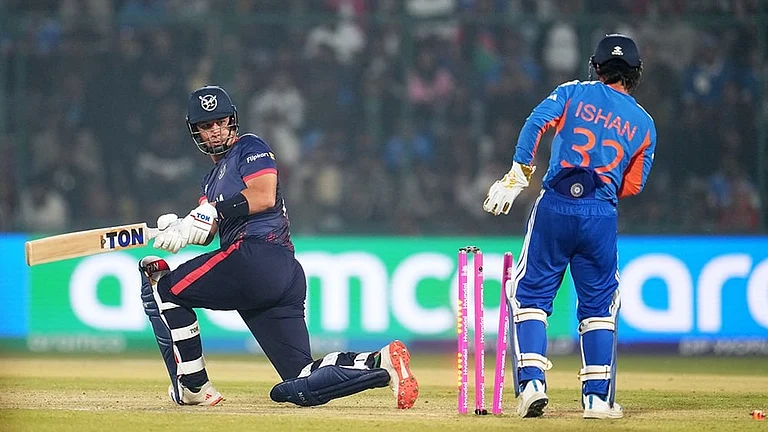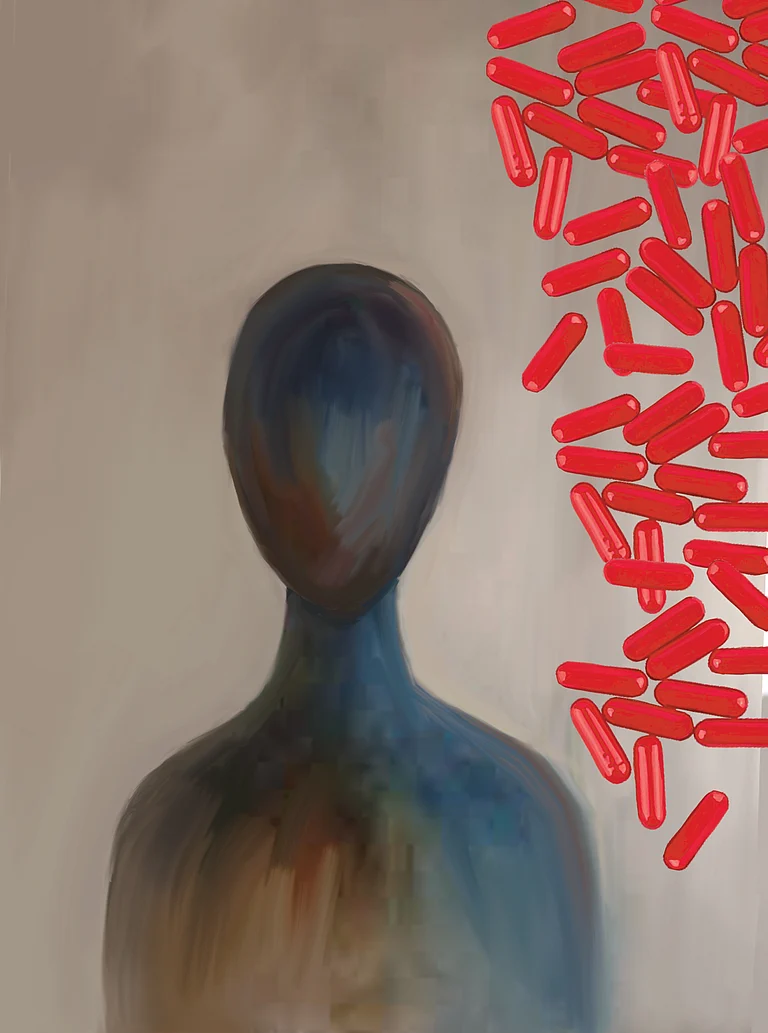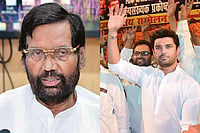Former Miss India and gay rights activist, Celina Jaitly -- known for her onscreen glamour girl image -- returns to Bollywood in a different avatar via OTT platform, with a sensitive portrayal in Ram Kamal Mukherjee’s Season’s Greetings: A Tribute to Rituparno Ghosh. Primarily based on the changing dynamics of mother-daughter bonding, it also touches upon same-gender love and inter-faith relationship. Giridhar Jha talks to the Austria-based actress about her new film, her career, #MeToo movement, patriarchal mindset in Bollywood, and also her real-life role of the United Nations’ goodwill ambassador for LGBTQIA rights. Excerpts from the interview:
Your performance in Season's Greetings, now streaming on Zee5, has been creating a lot of buzz? What kind of the feedback are you receiving?
I am overwhelmed with the phenomenal response from the audiences and the critics alike. It is rare for a film to receive so many four and five-star reviews. It has been a long journey with so many ups and downs for me to reach this point but I am grateful.
Why did you choose a 45-minute-long movie for your return to Bollywood after many years? You could have chosen a full-length feature film…
I guess it is destiny. Director Ram Kamal Mukherjee and I were discussing something else, when he suddenly popped up with this script. After reading it, I realised it might be God’s own way of saying that I need to take the movement for equal rights of LGBTQIA community ahead through this film. I have been a spokesperson for LGBTQIA for the past 18 years and as an activist, I have been appointed by the United Nations as a goodwill ambassador for the same cause.
There was another reason to do this film. I recently lost my mother, and while I was reading the script I could relate to the intense relationship that I shared with her. I had tears rolling down, as I was going through the character graph of the daughter in the film.
You have been very vocal about your support to LGBTQIA community over the years. Has India become a better place for them after the scrapping of Article 377?
Abrogation of Section 377 by Supreme Court is a historical decision but we have a long way to go as far as shedding stereotypical understanding of the LGBTQIA community in India is concerned. As a United Nations’ equality champion, I have always believed that combating discrimination of any kind requires a change not just in laws and policies but in hearts and minds too. There is still a lack of understanding about the LGBTQIA community. The biggest block is that the Indian society in general is not ready to educate itself about homosexuality and its acceptance on any level. Its reasons could be anything from religious to sheer ignorance.
Even though times are changing and we are gradually becoming more accepting of gays and lesbians, the homophobia and negativity are still part of our cultural fibre. Even if people don’t think they are homophobic, or even if they have gay friends, they still grew up with all the messages and stereotypes about gays and lesbians. Overall, the fact of the matter is that India is way behind at all levels when it comes to "acceptance" of sexual minorities.
Do you think a film like Season’s Greetings can make a difference at this juncture?
The film, which deals with every aspect of LGTBQIA, comes at a historic moment for India’s lesbian, gay, bi and trans population, following the decision of the Supreme Court to strike down a colonial-era ban on consensual, same-sex relationships. Changing attitudes is never easy but it has happened on other issues and it is happening already in many parts of the world on this one. It begins with often difficult conversations. I am convinced that the best way to have this difficult conversation is through a medium most reliable to people. I believe that there is nothing more powerful than the medium of cinema. Many heroes would still remain unsung if their story had not been told through cinema. Season’s Greetings definitely has the ability to stir a need for those difficult but necessary conversations in its own subtle way.
Our film is also the first Indian film to cast a transgender actor in a mainstream film/role. It is also a tribute to Rituporno Ghosh, which will focus on the need for in-depth understanding of what being specifically LGBTQIA woman truly entails in a country like India where millions of marginalised people only now have a slight window of opportunity to breathe the air of freedom. Actually, some have finally had the opportunity to “ask” for ‘right to life’ and live on their own terms.
Given the fact that you have been championing the rights of LGBTQIA community at the global level, what was your experience like while doing this film?
A famous gay make-up artist was a mother figure to me in my struggling days as a model in Kolkata. His immense, unconditional love for me, having seen up-close his trials and tribulations as a gay middle-aged man turning senior citizen hit a chord with me. Incidentally, I was at the same time in a traumatic relationship with a closeted gay man. At 16, you think prayers and shamans can fix this but these two person’s untimely death a few years later made me realise that everyone has the right to life and choose whom to have a relationship with. I thought I had to do something about it. After 12 years as an activist, the United Nations appointed me as a goodwill ambassador for the LGBTQIA cause. We have come a full circle now after abolishment of section 377. Needless to say, this script was a calling from beyond.
Did you relate to your character of Romita in the film while portraying her onscreen?
I remember ‘Romita’ was a character in director Rituparno Ghosh’s Dahan (1997), which was based on Suchitra Bhattacharya's novel of same name. I was in school when I saw Dahan and was fascinated by Romita’s character. Little did I know that after a journey of 23 years, I will get to play the lead in a film, which will be a posthumous tribute to RituâÂÂda asRomita.
But I am nothing like Romita in reality, so playing Romita was certainly a challenge but I trusted and believed in Ram (director). I shed Celina and tried to dissect Romita just like Ritu-da would have done with a scalpel, being a master of depicting human relationships against contemporary or periodical social contexts. Lillete Dubey-ji (who plays the mother in the film) and I also connected at a personal level for a few days before the shoot began. I had a wonderful opportunity to do a few workshops under her guidance, which were very enlightening. I wish all filmmakers would make such efforts. The wonderful response to the movie at many international film festivals definitely proves it to be the right choice. I am eternally grateful to Ram and the spirit of Ritu-da.
You have always had an image of glamour girl since your debut film, Janasheen (2003). Do you think you have got fewer opportunities during your career to showcase your acting talent because of that?
Absolutely. I truly believe that I was typecast. Also, I came from a very humble Army background and I had no one initially to guide me through my journey. It did become rather frustrating at one point. I felt saddened by the fact that no one was willing to give the actor within me a chance. People only wanted a plastic doll on screen. Hence, I took a conscious decision not to return to cinema when I got married. However, my mother never gave up on me. When my mother passed away, I returned to cinema in keeping with her last wish. Her blessings led Ram to approach me with a script. All the fabulous reviews for the film prove that it was worth coming back, just as my mother wanted.
Are you open to more offers from Bollywood now? There have been reports lately about Boney Kapoor being keen on making a sequel of No Entry (2005) with the same star cast?
Yes, I am open to films and I love comedies. However, I look forward to such scripts, which can do justice to the actor within me also.
Do you think the 'patriarchal' Bollywood has changed since you made your debut in terms of opportunities for women actors and technicians?
Even though women-centric films are getting success at the box office, I believe that behind the big screen, only a disproportionately tiny percentage of women are working as producers, writers, directors, lyricists, and sound and light technicians. We still have spaces in many sectors within media and entertainment where women are perhaps not forbidden, but they definitely do not have an equal access. According to the World Economic Forum, there is no country on earth where women make as much as men in terms of salary for the same work. In our industry the impact is in continuum. While female-lead films are doing well, we are still very far from pay and budget parity.
Has film industry also become a safer place for women now because of the #MeToo movement?
No, it has not. My personal belief is that though #MeToo created immense awareness about sexual harassment, there have been no massive changes or laws that protect women from sexual harassment, specifically in the industry. In many cases where it boils down to "your word against mine", many of the women who spoke out are already being threatened with legal action for defamation. It will be a long time before sexual harassment is a thing of antiquity.
How do you look back at your journey as an actor? And why did you choose to leave the industry when you were still getting plenty of film offers?
I took this break on purpose. I have been enjoying limelight since I was 15 years old and there came a point where I felt the actor within me was getting smothered. I was no longer happy being a “doll” onscreen. Besides, I had started my professional career when others enjoy their teens in colleges and have campus romances. When Peter Haag (her Austrian husband) came into my life, he was my charming prince. I knew if I had to settle in life then it had to be with him. Then, we were blessed with twins twice (Winston, Viraaj, Arthur and Shamsher). I wanted to enjoy the amazing new season of my life of being a wife and a mother without it being documented by the media on a daily basis. But I guess destiny had other plans and here I am -- back with a critically-acclaimed film!


























